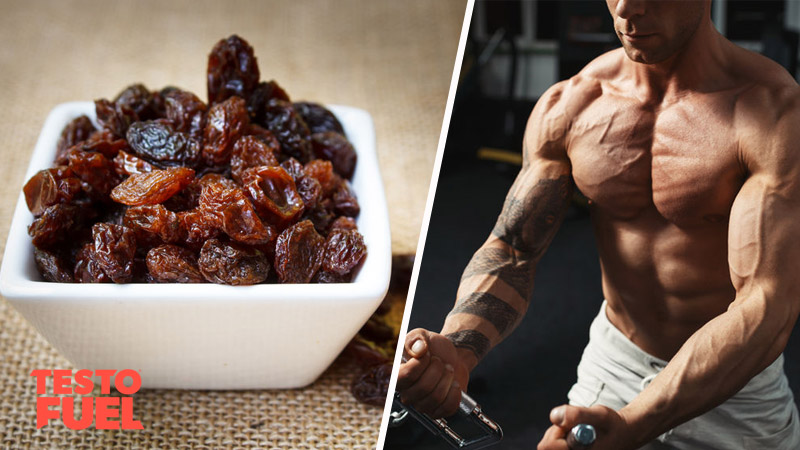TestoFuel Blog : Make Gains & Pack on the Muscle

In order to increase your testosterone levels you’ll need to work hard in the gym but also maintain a healthy and nutritious diet. By providing your body with all of the necessary building blocks for optimal hormone development, you’ll give yourself the best opportunity to enhance your masculinity.
Whilst some nutrients can be optimized through diet alone, others require supplementation to reach the necessary amounts needed to make a difference. One nutrient – boron – has become increasingly popular in those who wish to build muscle, enhance athleticism and improve hormone profiles.
But is it really an effective nutrient or is it just another example of a dogmatic approach to nutrition? In this article we’ll take a look.
Here what we’ll cover:
Boron is a metalloid, chemical element in the IIA group of the periodic table. It has the chemical symbol B and atomic number 5. It is only needed in trace amounts in the body but it plays a number of important functions such as supporting bone and brain health [1].
You’ll find this mineral in a number of different foods including avocados, currants, grapes and raisins, as well as lentils, nuts and kidney beans. You’ll also find it in a number of cosmetic products too, such as skin creams and make up – often in the form of boron nitride. This is due to its reported ability to remove excess oil from the skin and create a textured but flat surface.
Due to its small size and ability to complex with organic compounds, this mineral interacts with polysaccharides as well as vitamin substances such as riboflavin. This makes it an interesting compound for nutrition and health – although debate exists as to whether or not it should be classed as essential to human diet or not [2].
Boron appears to facilitate the actions of other hormones and chemical processes including the metabolism of calcium, phosphorous and magnesium. As such it has been implicated in not only a role in maintaining bone growth, but central nervous system function too. Additionally, it has been shown to alleviate arthritic symptoms, facilitates hormone action and reduce risk for some types of cancer in a selection of studies [3].
One early study from 1987 found that in a group of post-menopausal women, boron citrate was able to elevate estradiol levels – a type of estrogen, whilst at the same time increasing testosterone concentrations [4]. Interestingly, the changes to hormone levels caused by the 3mg per day of the supplement were more prominent in the group that had low magnesium levels.
Although this was a small sample study and used women who’s T levels are much lower than in men, it didn’t stop the bodybuilding industry getting excited about this potential wonder supplement.
But has there been any studies since the 1980s that back up the use of boron to enhance testosterone? Or was it simply a case of misrepresented data?
Let’s have a look…
Boron is actually quite an understudied nutrient compared to others such as zinc or vitamin D3. The claims that it increases T levels are exclusively made on the evidence provided by only a small number of studies, including the one on older females.
One of these studies, published in the Journal of Trace Elements in Medical Biology [5], found that whilst a short dose period of 6 hours started a trend to increase free testosterone in a group of healthy males, total testosterone levels didn’t increase. After 7 days, free T levels finally reached significant levels although for such a bio-available nutrient, this was surprisingly slow.
The study shows a small amount of promise, but with a the sample of only 6 subjects was far too small for it to be considered reliable.
Another study, found in Environmental Health Perspectives [6], used a group of young bodybuilders – a much more useful sample in comparison to post-menopausal women.
Each of the 19 bodybuilders were given either 2.5mg of boron or a placebo over a 49-day period. Both groups improved their strength, lean mass and more importantly their testosterone levels. However, whilst the experimental group significantly increased their plasma boron levels, there was no difference between groups.
The improvements made over the 7-week period were simply from training with weights and not from the supplementation itself.
As you can see, there’s limited evidence to suggest that this mineral will increase testosterone levels. The fact that foods high in boron suggests that a diet rich in the nutrient will suffice. Nielsen [3] suggests that a diet rich in fruits, vegetables, nuts and pulses should be recognized as a reasonable dietary recommendation to enhance health and well-being.
Further to this, one study suggested that although boron’s mechanism of action has not been defined, it may be mediated by increasing the concentration of steroid hormones such as testosterone [1]. If anything, it might be wise to focus on improving T levels first, in order to then allow boron to do it’s work, not the other way around.
Boron is a metalloid element that has been implicated in a number of health benefits including bone and cognitive health. Although often marketed a a testosterone-boosting nutrient, there is very little evidence to support the claims made by supplement manufacturers. This mineral just doesn’t cut it as a male health supplement.
We strongly suggest that until more evidence is made available you focus on more scientifically researched nutrients, spend time lifting weights in the gym and aim to optimize your body composition instead.